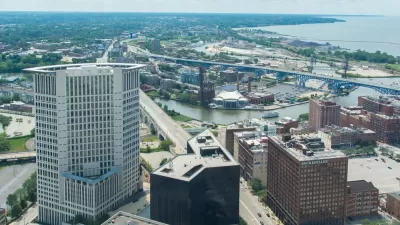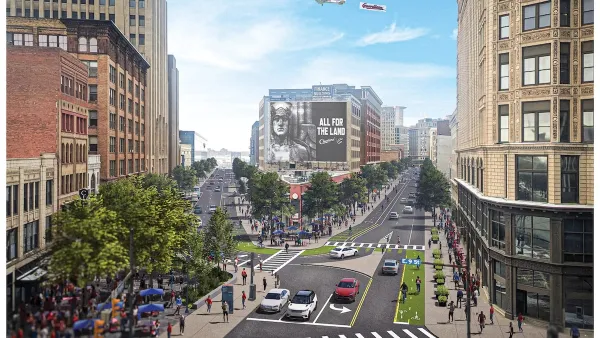A rainwater retention facility in Cleveland represents a small step forward with a controversial 25-year, $3 billion plan to clean Lake Erie.
"Officials on Monday unveiled the first of a series of ''green' projects that use natural landscaping, rather than underground pipes, to absorb rainwater and help reduce sewage overflows into Lake Erie," reports Andrew J. Tobias.
The so-called "Project Clean Lake" [pdf] would implement a federal consent decree requiring the Northeast Ohio Regional Sewer District to reduce the total volume of raw sewage discharges from 4.5 billion gallons to 494 million gallons annually. The sewer district's proposed plans to meet the requirements of the consent decree have provoked opposition from stakeholders and the media who prefer a "cheaper, greener" approach.
The recently revealed project makes use of three sites in the "foreclosure-blighted" Slavic Village neighborhood by installing "a man-made basin designed to collect and absorb rain water that otherwise would flow into sewers," according to Tobias.
"Northeast Ohio Regional Sewer District officials envision the projects as a component of their $3 billion effort to dig giant underground storage tunnels to keep storm runoff from flooding sewers and sending untreated sewage into Lake Erie." This component of the plan cost $338,000, but another 10 projects are already planned, with a pricetag of $82 million.
FULL STORY: First 'green' sites unveiled in $3 billion effort to keep sewage out of Lake Erie

Planetizen Federal Action Tracker
A weekly monitor of how Trump’s orders and actions are impacting planners and planning in America.

Maui's Vacation Rental Debate Turns Ugly
Verbal attacks, misinformation campaigns and fistfights plague a high-stakes debate to convert thousands of vacation rentals into long-term housing.

Restaurant Patios Were a Pandemic Win — Why Were They so Hard to Keep?
Social distancing requirements and changes in travel patterns prompted cities to pilot new uses for street and sidewalk space. Then it got complicated.

In California Battle of Housing vs. Environment, Housing Just Won
A new state law significantly limits the power of CEQA, an environmental review law that served as a powerful tool for blocking new development.

Boulder Eliminates Parking Minimums Citywide
Officials estimate the cost of building a single underground parking space at up to $100,000.

Orange County, Florida Adopts Largest US “Sprawl Repair” Code
The ‘Orange Code’ seeks to rectify decades of sprawl-inducing, car-oriented development.
Urban Design for Planners 1: Software Tools
This six-course series explores essential urban design concepts using open source software and equips planners with the tools they need to participate fully in the urban design process.
Planning for Universal Design
Learn the tools for implementing Universal Design in planning regulations.
Heyer Gruel & Associates PA
JM Goldson LLC
Custer County Colorado
City of Camden Redevelopment Agency
City of Astoria
Transportation Research & Education Center (TREC) at Portland State University
Jefferson Parish Government
Camden Redevelopment Agency
City of Claremont





























